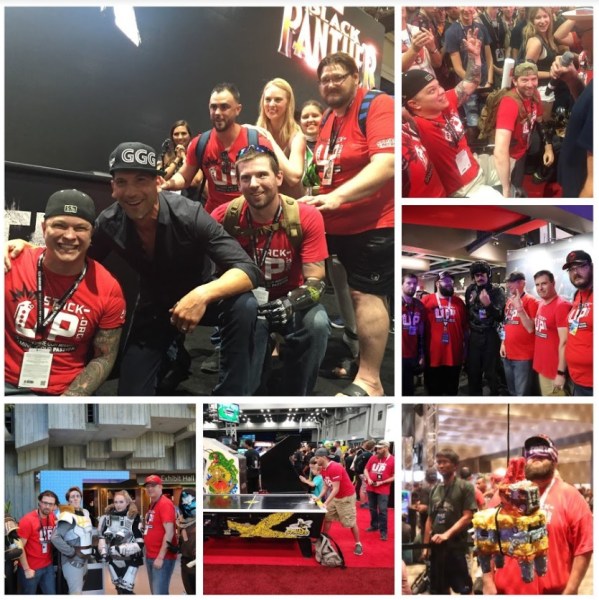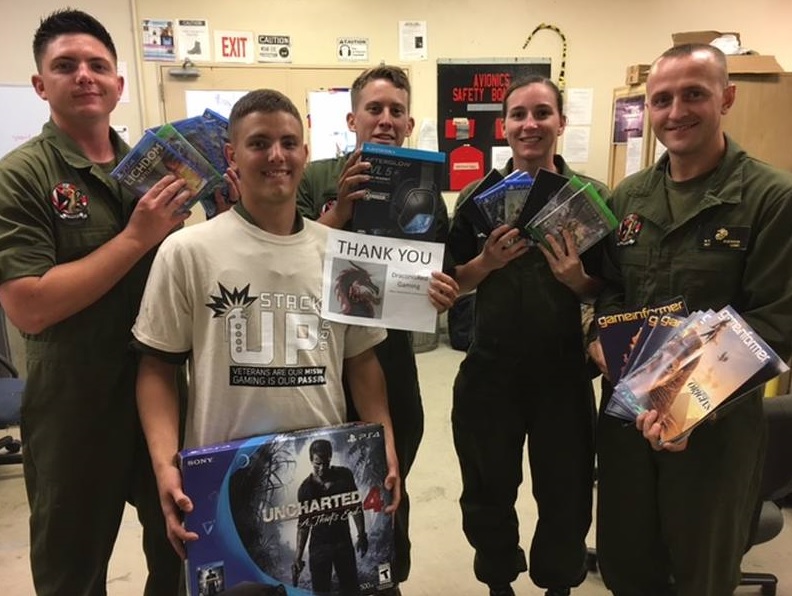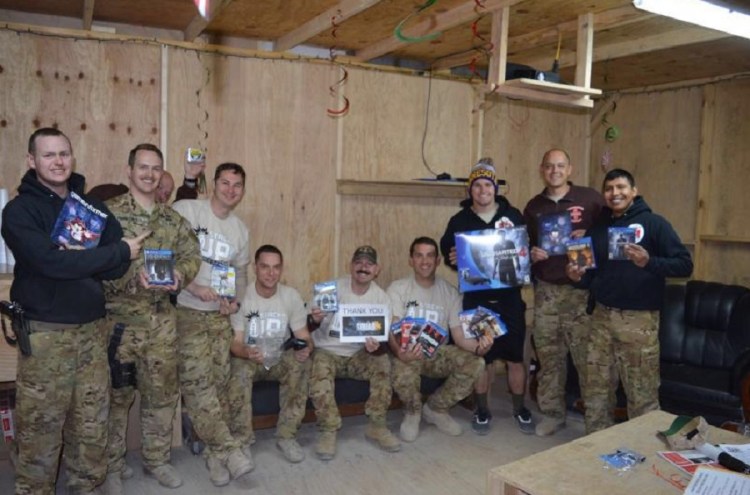GamesBeat: Does Stack Up do something different than your previous organization?
Machuga: Yeah, that was one of the big arguments with my old business partner. He didn’t see the value in the whole gaming piece. It was more about, we should just be a generalized military support organization and still do gaming stuff, but gaming’s not lucrative. You have trouble talking to silver-hairs at Fortune 500 companies about video games. But gaming was why I started this thing. It’s the thing that differentiates us from everybody else out there. There’s about 10,000 military charities out there. None of them deal with gaming. There are already enough charities doing good work with veterans. What we’re doing is bringing that into a new space that has no real effort being organized.
As we’re starting to see with organizations like Wounded Warrior and the VA, they’re starting to dip their toes into the gaming space, because they see dollars. They see blood in the water with Twitch. How can we get a part of that? We just happen to have a head start on that. It started off as a carbon copy of Supply Drop, and now it’s branched out dramatically with the inclusion of our work with the Centers for Disease Control, fighting veteran suicide, which is a new piece for us in 2019.
Now we’re sending guys to the American Association of Suicidology conference in Denver. We have guys who are talking to the VA and the National Institutes for Health about mental health. Again, this is not what I was expecting a couple of years ago, but — we’ve gone from kind of supporting guys’ mental well-being, helping out as far as morale goes and keeping people keepy. But now we’re actively saving people’s lives with our program. It’s an incredible feeling. It’s a whole different ballgame now.
June 5th: The AI Audit in NYC
Join us next week in NYC to engage with top executive leaders, delving into strategies for auditing AI models to ensure fairness, optimal performance, and ethical compliance across diverse organizations. Secure your attendance for this exclusive invite-only event.
GamesBeat: It feels like there’s a lot of game-related charities that have come into their own in recent years. There’s Able Gamers, Humble Bundle. There’s Extra Life, which you mentioned. They all seem to have different purposes, but they’re building higher profiles.
Machuga: Actually, with Able Gamers, they were doing stuff before we got started. They’ve been grinding away for a long time. They really found their purpose with the announcement of the XAC from Microsoft. They’re finally getting their shot. Extra Life has never had a problem. They’re part of Children’s Miracle Network, so they’ve had a — that’s the thing. There are two different tiers of charities out there. There are the charities that are supported by major organizations like St. Jude’s, and then there’s the base of charities like myself, Able Gamers, Child’s Play. Child’s Play is part of Penny-Arcade, which is nothing to sneeze at, but they don’t have a hospital in Tennessee where they fly people out to raise money. There’s just two different levels.

Above: Stack Up is a regular at events like PAX.
GamesBeat: There are also things on the developer side like Games for Change.
Machuga: Yeah, or CODE, the Call of Duty Endowment at Activision, things like that. They have their own things they’re doing.
GamesBeat: Is there a feeling that this is a more important conversation, or people are more willing to pay attention and talk about this?
Machuga: Since the inclusion of our Overwatch program, our suicide awareness and prevention team — that’s our group on Discord where we have 24/7 support for individuals, not just veterans, but civilians as well. Anybody who feels they need somebody to talk to, veteran or not, you can come in at any time of the day or night and we can help them out and get them to a point — we’ve had health and wellness checks. We’ve had police go in and confiscate weapons from people, because we felt they were a threat to themselves. We’ve actively saved lives through this program, which is stunning to think about.
Not everybody can say they’ve been a veteran, but we’re going into an age where everyone feels like they have mental health issues of some kind or another. There are a lot more people out there who struggle with anxiety and suicidal ideation and things like that. That’s opened up the floodgates as far as people getting behind us. Now everybody can feel like — they’re not just helping veterans. They’re helping their neighbors and their friends who might also have these problems too.
An organization like Take This, which is an awareness organization, is now talking about utilizing us for resources, because we’re actively providing support. It’s not just an awareness campaign. We’re providing the support that they’re saying to go get, which is crazy to think about. I love the guys over at Take This, but it was definitely a surprise conversation. “We should start promoting you guys.” I never thought of that, but yeah, I guess you should.
GamesBeat: Have you ever talked about how many people you’ve helped, or donations that have come in?
Machuga: Yeah, we have an infographic we’re getting done right now as far as numbers go. We’re just wrapping on our annual report right now, which goes into our numbers for last year.
GamesBeat: You mentioned Memorial Day. Do you have something special coming?
Machuga: We do. I’m still waiting to lock in — we’re supposed to do something over in Vegas. I don’t want to go into detail if it’s not going to happen. But we’re trying to do that. And then the usual — because the larger charities push out in April and also November, there’s really no way for us to get some time to ourselves, you might say. We have to do charity fundraising events more frequently, because right now everybody’s talking about St. Jude’s, but it’s also military appreciation month in May.
We want to make sure people understand, we’re doing stuff in May, but we can do stuff any time. If you want to do stuff on the fourth of July, you want to do stuff in August, we can do it whenever you want. Let us know and we’re happy to make some noise for you. Those are our two major funding periods through the year — May, which is military appreciation month, as well as mental health awareness month, and then November, which is Veterans Day and Remembrance Day, in the states and in the U.K. That’s also St. Jude’s, and then Extra Life is the weekend before Veterans Day. It makes it tough to get out from under them, but we do what we can.
GamesBeat: How is it working with the game industry today? What sort of interesting relationships do you have now?
Machuga: As I said, there are definitely a lot of games out there that seem to be taking advantage of the whole people shooting each other in the face with assault rifles, but we’re not getting the support you would think we would get. We struggle with a lot of — there’s a common misconception out there, when you deal with adult charities, that the people who you are servicing have done this to themselves. The veterans we’re helping get a fraction of a fraction of the population that say, “Well, they signed up. They knew the risks. We don’t want to help them.” That’s why children’s charities do so well in the space, because they’re blameless victims, which I completely understand.
But it’s the difference between an organization like an Extra Life and a 1UpOnCancer, which is a small charity like ours that focuses on providing support to adults with cancer, not just kids. They’re over there struggling away, because again, well, that guy probably smoked three packs of cigarettes a day and brought that on himself. That may or may not be the case, but — people have a tendency to consider, well, this is their fault, so we don’t need to help them.

Above: Stack Up helps with “air assaults” that get veterans to gaming events.
GamesBeat: There’s a stigma to overcome before you can make people listen to you.
Machuga: Absolutely. That’s why these other charities are so successful in the space. There’s one less hurdle that these organizations have to deal with. I’ve made a joke, that if somebody ever wanted to get in the space and have a successful charity, you need to find a charity that supports sick puppies or something like that. Again, blameless victims that people can feel sorry for, people just throw money at them. That’s just the truth. No getting around it.
But that doesn’t mean that what it is we do isn’t that much more important. As a matter of fact, I think it’s more important, because it’s a harder job. It still needs to be taken care of. Our responders need help as well. Just because they’re the over the game of 21 doesn’t mean they didn’t do their job. I get a little sensitive when it comes to this. It’s a frustrating position to be in. Everyone gets really excited about supporting the troops, but when you ask them, when it actually comes down to it, it’s kind of pulling teeth.
GamesBeat: What do you find that people responds to, or that resonates about your message and the events you do?
Machuga: As much as I talk about not getting support from people, you always have the other side of the coin. Rah-rah flag-waving veteran-lovers, and God bless them, they provide a lot of the support to what we do. Those are the guys for whom it doesn’t matter. They understand why it’s important. That resonates.
And as I said earlier, the mental health awareness piece we provide has been opening us up to a lot of people who would have otherwise walked right past us, because it’s something that they themselves can — not appreciate, but they can understand. It’s not just about PTSD. It’s about mental health awareness in general. They may have dealt with suicidal or homicidal ideation, things like that, issues that they can get behind because they have felt that way. They may not have been in the service, but they can understand that part of it. That’s been opening a lot of doors for us, which wasn’t expected at all.
Our Overwatch program started out as a community-driven effort, because when you put a bunch of veterans in a room together, eventually the conversation is going to get pretty dark. Some people are going to say some shit, and next thing you know, hey, if we don’t do something we’re going to lose one of these guys. It started up as a knee-jerk reaction to having a community of veterans who needed help and who didn’t have anything in place for them. It started off small, and over time turned into this — we should really look into doing something about this.
It’s taken a dramatic turn. That’s where the CDC came in, because they got hold of that and fell in love with it. “This is amazing. They’re helping people where they’re comfortable, and using a medium they feel comfortable with, through gaming.” Which, again, I didn’t realize. I did an interview back in the day with Polygon. They sent out a video team with my house and set me down in front of — this must have been a calculated thing. They had me playing Battlefield and asked me questions while I was playing. The answers I came up with while I was distracted — I watched the video afterward and thought, “I can’t believe I said all this stuff.”

